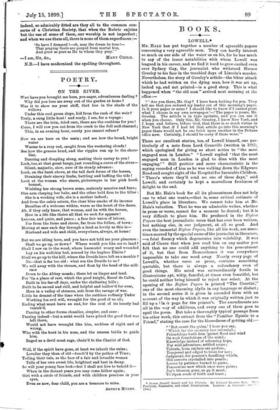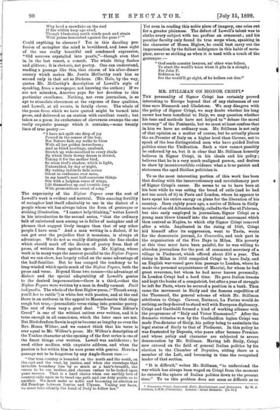BOOKS.
LOWELL.*
MR. HALE has put together a number of agreeable papers concerning a very agreeable man. They can hardly interest so much on our aide of the water as on hie, for he has much
to say of the lesser notabilities with whom Lowell was
leagued in his career, and we find it hard to grow excited even over Sydney Gay, the journalist who withstood Horace Greeley to his face in the troubled days of Lincoln's murder.
Nevertheless, the story of Greeley's article—the bitter attack which he had written on the dying man, how it was set up, locked up, and not printed—is a good story. This is what happened when "the old man" arrived next morning at the office :—
" Are you there, Mr. Gay ? I have been looking for you. They tell me that you ordered my leader out of this morning's paper. Is it your paper or mine ? I should like to know if I cannot print what I choose in my own newspaper.'—` The paper is yours, Mr. Greeley. The article is in type upstairs, and you can use it when you choose. Only this, Mr. Greeley, I know New York, and I hope and believe, before God, that there is so much virtue in New York that if I had let that article go into this morning's paper there would not be one brick upon another in the Tribune office now. Certainly, I should be sorry if there were.'"
There are excellent stories, too, of Lowell himself, one par- ticularly of a note from Lord Granville (written in 18S21, which apologised for giving so short notice to "the most engaged man in London." "Lowell replied 'that the most engaged man in London is glad to dine with the most engaging.'" Still prettier and more characteristic is the saying recorded of him as he was walking down the Edgware
Road and caught sight of the Hospital for Incurable Children. "There's where they'll send me one of these days," said Lowell; and certainly he kept a marvellous freshness of
delight to the end.
But Mr. Hale'a book for all its pleasantness does not help one to what one wants,—that is, some critical estimate of Lowell's place in literature. We cannot take him at Mr. Hale's valuation. That he was an admirable writer, whether in prose or verse, cannot for a moment be denied ; but it is very difficult to place him. He produced in the Biglow Papers the best journalistic verse that has ever been written, but nothing else, in our judgment, at all so good. And even the immortal Biglow Papers, like all his work, are some- times marred by the special curse of the journalist in literature, —a fatal fluency which degenerates into volubility. It was said of Cicero that when you read him on any matter you felt that no one could add anything to his presentment of it, but that from Demosthenes it was everywhere
impossible to take one word away. Nearly every page of Lowell's, whether verse or prose, contains something quotable, but there is always a redundancy even of good things. His mind was extraordinarily fertile in
illustrations apt, witty, fanciful, at times even beautiful, but he could neither bring himself to reject nor select. At the opening of the Biglow Papers is printed "The Courtin'," one of the most charming idylls in any language or dialect ; in the second series it is given in amended form with an account of the way in which it was originally written just to fill up a 1 la ik page for the printer's. The amendments are all in the way of additions, and every one of them goes to spoil the poem. But take a thoroughly typical passage from his other work, this extract from the "Familiar Epistle to a Friend," stating the case for the blessedness of getting old :— "'But count the gains,' I hear you say, Which far the seeming loss outweigh ; Friendships built firm 'gainst flood and wind
On rock foundations of the mind ; Knowledge instead of scheming hope, For wild adventure, settled scope ; Talents, from surface ore profuse, Tempered and edged to tools for use; Judgment, for passion's headlong whirls, Old sorrows crystalled into pearls ; Losses by patience turned to gains, Possessions now which once were pains ; Joy's blossom gone, as ge it must, To ripen seeds of faith and trust ;
Portratt/4 Facsimiles, and other Illustrations. London: A. Constable arpi
Why heed a snowflake on the roof If fire -within keep age aloof,
Though blustering north winds push and strain With palms benumbed against the pane ?' "
Could anything be cleverer ? Yet in this dazzling pro-
fusion of metaphor the mind is bewildered, and loses sight of the one really beautiful and condensed expression, "Old sorrows crystalled into pearls,"—though even that is, in the last resort, a conceit. The whole thing flashes and glitters ; it is rhetoric, not poetry. One can understand, reading a passage like this, that charm of his after-dinner oratory which makes Mr. Justin McCarthy rank him as second only in that art to Dickens. (Mr. Hale, by the way, quotes Mr. McCarthy's description of Lowell's style of speaking, from a newspaper, not knowing the author.) If we are not mistaken, America pays for her devotion to this
particular excellence. Nothing, not even journalism, is so apt to stimulate cleverness at the expense of finer qualities, and Lowell, at all events, is fatally clever. The whole of
the poem from which we have quoted might be turned into prose, and delivered as an oration with excellent result ; but taken as a poem its exuberance of cleverness swamps the one really exquisite passage which it contains,—some twenty lines of true poetry :—
"I have not spilt one drop of joy Poured in the senses of the boy, Nor Nature fails ray walks to bless With all her golden inwardness ; And as blind nestlings, unafraid, Stretch up wide-mouthed to every shade By which their downy dream is stirred, Taking it for the mother bird, So when God's shadow, which is light, Unheralded, by day or night, My waking instincts falls across Silent as sunbeams over moss, In my heart's nest half-conscious things Stir with a helpless sense of wings, Lift themselves up and tremble long With premonitions sweet of song."
The superiority of the Biglow Papers over the rest of Lowell's work is evident and natural. This amazing fertility of metaphor lent itself admirably to use in the dialect of a people whose wit has always taken the form of grotesque or striking illustration. "I cannot help thinking," writes Lowell in his introduction to the second series, "that the ordinary talk of unlettered men among us is fuller of metaphor and of phrases that suggest lively images than that of any other
people I have Been." And a man writing in a dialect, if he can get over the prejudice that it occasions, is always at advantage. We do not so readily distinguish the fine shades which should mark off the diction of poetry from that of
prose, of written from spoken speech. Mr. Kipling, whose work is in many ways the nearest parallel to the Biglow Papers that we can show, has largely relied on the same advantage of the half-familiar. But he has escaped the tendency to be long-winded which spoils much of the Biglow Papers, both the
prose and verse. Beyond these two causes—the advantage of dialect and the special adaptability of Lowell's genius
to the desired impersonation—there is a third,—that the Biglow Papers were written by a man in deadly earnest. Facit indignatio. The whole of the first Biglow poem, (" Thrash away, you'll hey to rattle ") is white-hot with passion, and at the end there is an outburst in the appeal to Massachusetts that rings rough but true,—journalistic verse rising into genuine poetry. The rest of them vary a good deal. "The Pious Editor's Creed" is one of the wittiest satires ever written, and it is terse enough in all conscience, which the later ones are not. But Birdofredum Sawin is apt to become as lengthy as even the Rev. Hosea Wilbur, and we cannot think that his verse is
ever equal to Mr. Wilbur's prose. Mr. Wilbur's description of the Yankee character at the opening of the first series is one of the finest things ever written. Lowell was ambidexter ; he used either medium with exquisite address, and when the passion is hot within him he uses prose with genius. Here is a passage not to be forgotten by any Anglo-Saxon race :—
"Our true country is bounded on the north and the south, on the east and the west, by justice, and when she oversteps that invisible boundary line by so much as a hair's-breadth, she ceases to be our mother, and chooses rather to be looked upon quasi noverca. That is a hard choice when our earthly love of country calls upon us to tread one path and our duty points us to another. We must make as noble and becoming an election as did Penelope between Icarius and Ulysses. Veiling our faces, we must take silently the hand of Duty to follow her."
Yet even in reading this noble piece of imagery, one cries out
for a greater plainness. The defect of Lowell's talent was to clothe every subject with too profuse an ornament ; and his
peculiar faculty only found its true scope when, speaking in the character of Hosea Biglow, he could best carry out the impersonation by the fullest indulgence in this habit of meta- phor, never so striking as when it is used with a touch of the grotesque
"God sends country lawyers, an' other wise fellers, To start the world's team when it gits in a slough; Fer John P.
Robinson he
Sez the world'll go right, of he hollers out Gee."







































 Previous page
Previous page